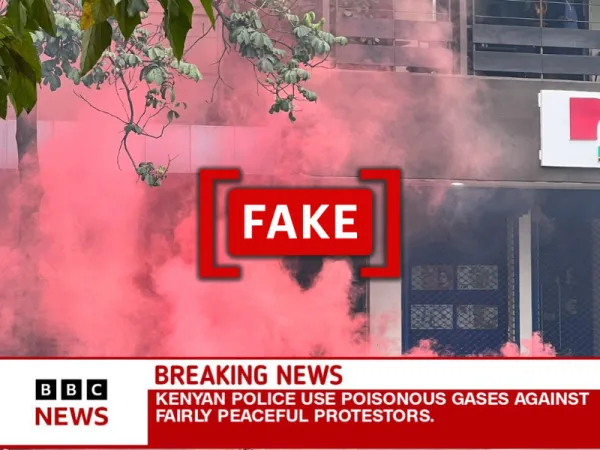By: Karin Koronen
July 17 2024
 Source: X/Modified by Logically Facts
Source: X/Modified by Logically Facts
A screenshot claiming pink gas was used against Kenyan protesters is fake and not from the BBC. The gas used by police in Nairobi is unidentified.
Context
Social media users have claimed on X, formerly known as Twitter, that Kenyan police used poisonous pink gas on peaceful protestors (see archived examples here, here, and here). The allegations quickly went viral, with some gathering more than 100,000 views in less than an hour.
The photos used in these posts featured a cloud of pink smoke and a supposed BBC news overlay, which stated, "Breaking news: Kenyan police use poisonous gases against fairly peaceful protestors." Other posts included a photo of an airplane dispensing an orange substance, captioned "Agent orange is banned! Ruto has launched chemical warfare on citizens." The hashtag #Rutomustgo was also often included with the posts.
Kenyan media outlet Citizen Digital reported on July 16, 2024, that an unidentified pink gas was used during a protest in Nairobi. However, the BBC News overlay is fake.
In fact
According to a Citizen Digital article on June 16, 2024, the police released a pink substance to disperse citizens in the streets of Nairobi. The outlet does not clarify which date this incident occurred. Citizen Digital also states that the substance has not yet been officially identified. Some people who participated in the protest reported trouble breathing.
Users on X are split over what the substance might be; some suggest it could be a "poisonous gas," while others speculate it might be Agent Orange, a highly toxic herbicide mixture used by the U.S. military during the Vietnam War, which can cause significant health problems. The latter has been banned in many countries, including the U.S. While there isn't a widespread, explicit ban on Agent Orange in Kenya's national legislation, the international laws these countries adhere to discourage its use generally. The pink substance or its components have not been officially identified. Thus, its relation to Agent Orange is purely speculation.
The photos often feature the logo and overlay of a BBC article. Although the BBC has covered news about the protest and also wrote about tear gas fired at anti-government protesters in Kenya on July 2, they have never published news with the caption "Breaking news: Kenyan police use poisonous gases against fairly peaceful protestors." Logically Facts also asked BBC for clarification, to which its spokesperson replied, "This was not issued by BBC Africa. We encourage audiences to follow our extensive coverage on the Kenyan protests via our official BBC Africa channels."
The anti-government protests in Kenya began on June 18 and are primarily driven by public discontent over the 2024 finance bill. This bill proposed various tax increases and changes, including a 16 percent VAT on essential items like bread and fertilizers. Many Kenyans feared it would magnify the already high cost of living. Activists have also called for systemic changes to clean up what they see as corruption and address poor governance. The protests have been marked by significant violence, with at least 54 people dead within the last month.
Protestors are calling for President William Ruto to step down, although he has already withdrawn the legislation and fired most of his cabinet. The activists are pressing for systemic changes, as they believe the government's policies are harmful and fail to address citizens' needs. They have pledged to continue protests until all their demands are met.
The verdict
According to Citizen Digital, an unidentified pink substance was used during the anti-government protests in Kenya. However, according to our research and a BBC spokesperson, the posts that imitate a BBC News article are fake.